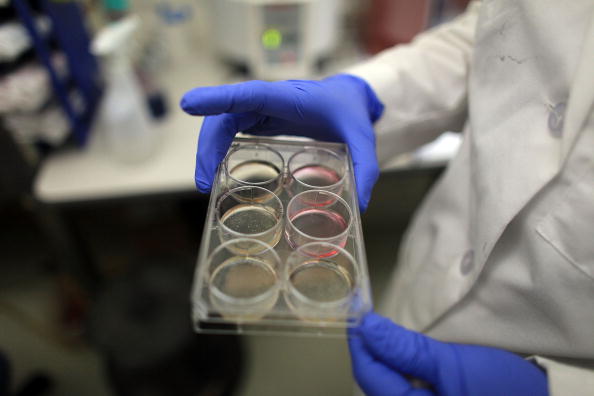Scientists grow genetically modified skin to save dying boy's life


A team of doctors in Germany and scientists in Italy were able to help a boy from Syria with a genetic disorder that left him with untreatable wounds covering 80 percent of his body.
The 7-year-old fled with his family from Syria to Germany in 2013, and by the time he started to receive treatment at Ruhr University Bochum, he was running out of time. He has a disease called junctional epidermolysis bullosa, caused by a mutation of the LAMB3 gene, which produces the protein that makes the top layer of skin connect to deeper layers underneath. The condition made his skin fragile and quick to blister, and his epidermis was still intact only on his head and a patch of his left leg. With all options exhausted, doctors reached out to scientists in Italy, asking if they could grow replacement skin for their young patient.
The scientists had regenerated healthy skin in a lab before, but never for as tall an order as this. They took epidermal cells from an area of his skin that did not have blisters, and genetically modified it in the lab, using a virus to correct the LAMB3 defect. The scientists then grew colonies of cells with corrected genes into sheets of genetically modified skin, and over two months, they grafted the skin to the patient. The grafts grew together and self-renewed, to the delight of the boy's medical team.
The Week
Escape your echo chamber. Get the facts behind the news, plus analysis from multiple perspectives.

Sign up for The Week's Free Newsletters
From our morning news briefing to a weekly Good News Newsletter, get the best of The Week delivered directly to your inbox.
From our morning news briefing to a weekly Good News Newsletter, get the best of The Week delivered directly to your inbox.
Once the epidermis has regenerated, the stem cells take over as in a healthy person, Michele De Luca at the University of Modena told The Guardian. Two years after the surgeries, the boy is doing well, does not take any medication, attends school and plays sports, and when he has a cut, his skin heals.
A free daily email with the biggest news stories of the day – and the best features from TheWeek.com
Catherine Garcia has worked as a senior writer at The Week since 2014. Her writing and reporting have appeared in Entertainment Weekly, The New York Times, Wirecutter, NBC News and "The Book of Jezebel," among others. She's a graduate of the University of Redlands and the Columbia University Graduate School of Journalism.
-
 Will the mystery of MH370 be solved?
Will the mystery of MH370 be solved?Today’s Big Question New search with underwater drones could finally locate wreckage of doomed airliner
-
 The biggest astronomy stories of 2025
The biggest astronomy stories of 2025In the spotlight From moons, to comets, to pop stars in orbit
-
 Why are micro-resolutions more likely to stick?
Why are micro-resolutions more likely to stick?In the Spotlight These smaller, achievable goals could be the key to building lasting habits
-
 Blue Origin launches Mars probes in NASA debut
Blue Origin launches Mars probes in NASA debutSpeed Read The New Glenn rocket is carrying small twin spacecraft toward Mars as part of NASA’s Escapade mission
-
 Dinosaurs were thriving before asteroid, study finds
Dinosaurs were thriving before asteroid, study findsSpeed Read The dinosaurs would not have gone extinct if not for the asteroid
-
 SpaceX breaks Starship losing streak in 10th test
SpaceX breaks Starship losing streak in 10th testspeed read The Starship rocket's test flight was largely successful, deploying eight dummy satellites during its hour in space
-
 Rabbits with 'horns' sighted across Colorado
Rabbits with 'horns' sighted across Coloradospeed read These creatures are infected with the 'mostly harmless' Shope papilloma virus
-
 Lithium shows promise in Alzheimer's study
Lithium shows promise in Alzheimer's studySpeed Read Potential new treatments could use small amounts of the common metal
-
 Scientists discover cause of massive sea star die-off
Scientists discover cause of massive sea star die-offSpeed Read A bacteria related to cholera has been found responsible for the deaths of more than 5 billion sea stars
-
 'Thriving' ecosystem found 30,000 feet undersea
'Thriving' ecosystem found 30,000 feet underseaSpeed Read Researchers discovered communities of creatures living in frigid, pitch-black waters under high pressure
-
 New York plans first nuclear plant in 36 years
New York plans first nuclear plant in 36 yearsSpeed Read The plant, to be constructed somewhere in upstate New York, will produce enough energy to power a million homes
